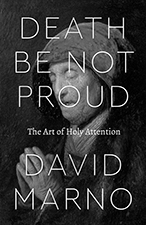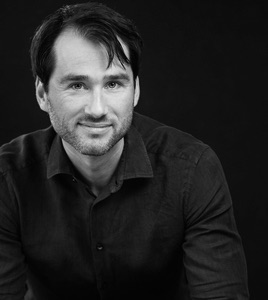BCSR is delighted to announce David Marno’s appointment as new co-director. In his research Marno, an associate professor of English, explores the connections between early modern literature and religious practice, with particular focus on the nature and role of prayer in these contexts. His first book, Death Be Not Proud: The Art of Holy Attention (Chicago, 2016), analyzes John Donne’s Holy Sonnets as a nexus of premodern devotional, literary, and philosophical attentiveness. Marno succeeds founding BCSR co-director Mark Csikszentmihalyi (East Asian Language and Cultures), and will serve alongside founding co-director Jonathan Sheehan (History).
As part of our ongoing celebration of five years of BCSR programming, we asked Marno to be the first respondent in our new “5 Questions” series. Here he shares the origins of his interest in religion, his vision for BCSR, and the background to his current work on prayer.
Your most recent and current projects on, respectively, attention and prayer, seem particularly compelling. Before we get to those, however, could you tell us how, personally and professionally, you came to work on these aspects of religion?
I became interested in religion at a very particular moment in my life, at the time when I transitioned from one discipline (philosophy) to another (literature). I read Hegel on the meaning of history one day, and then Defoe the next on why the story of Robinson Crusoe wasn’t a simple lie. They talked about completely different subjects, and yet they seemed to be using similar terms, such as revelation, allegory, and so on. Then it dawned on me that the terms they used were from religion, particularly from Christian millenarianism and Biblical hermeneutics. So I wrote a paper on apocalypse as a genre of writing and thought, and since then I’ve been interested in religion in both of its senses, that is, as a particular set of behaviors in the world, and as a concept that helps us make sense of those behaviors.
On a more personal note, I am sure having grown up in a socialist country has something to do with my interest in religion, too. During the last years of the socialist regime in Hungary, religion was mostly tolerated but also consistently discouraged. I was a child at the time so this ambivalence didn’t strike me as strange or even noteworthy. But when decades later I started thinking about Defoe’s own strange relation to the apocalypse, it suddenly hit me how curious it was to be raised in a country that continued to observe a mostly Catholic liturgical calendar even as school textbooks used the familiar Marxist phrases from superstructure to opium of the people to describe religious behavior.
Could you tell us a little more about your current project, on prayer in the aftermath of the Reformation? How does this build on your previous work on attention? Are your tentative findings applicable to discussions of religious life in 2018, or to other notable areas of contemporary culture?
What intrigues me most about prayer is its curious position within Christian religion. On the one  hand, it’s one of the few aspects of religious life that have never been questioned in the history of Christianity. The most orthodox theologians and the most radical reformers would both stress the centrality and importance of prayer; it’s the cornerstone of Christian life. On the other hand, from the perspective of Christian theology, prayer’s function is rather unclear. If God is omniscient and omnipotent, and most Christian authors claim he is both, then what is the point of bothering him with our requests? In this sense, at the heart of Christian religion there is a paradox, but it’s one of those paradoxes that seem to animate rather than disturb their surroundings. The project that Niklaus Largier and myself are working on is a history of how theologians and devotional authors have tried to respond to this paradox throughout the centuries, and how their answers are reflected in secular works of art and culture in modernity.
hand, it’s one of the few aspects of religious life that have never been questioned in the history of Christianity. The most orthodox theologians and the most radical reformers would both stress the centrality and importance of prayer; it’s the cornerstone of Christian life. On the other hand, from the perspective of Christian theology, prayer’s function is rather unclear. If God is omniscient and omnipotent, and most Christian authors claim he is both, then what is the point of bothering him with our requests? In this sense, at the heart of Christian religion there is a paradox, but it’s one of those paradoxes that seem to animate rather than disturb their surroundings. The project that Niklaus Largier and myself are working on is a history of how theologians and devotional authors have tried to respond to this paradox throughout the centuries, and how their answers are reflected in secular works of art and culture in modernity.
Your work, examining links between literature and religious practice, is interdisciplinary at its core. How do you navigate work between at least two fields? What role do organizations like BCSR play in such research?
I don’t really think in terms of disciplines; when I grow interested in a question, I follow it as far as I can and deal with the consequences later. But those consequences vary dramatically depending on which discipline’s threshold one has crossed. One of the things I very much like about religious studies is that it is still quite open to outsiders and newcomers, probably because of its relative novelty and because of its immense internal diversity. I think BCSR has been exemplary of this openness and I hope it’s going to stay that way.
Going forward, what are your priorities for BCSR? In a broader vein, if you could imagine the ideal state of religious studies in ten years, what would it look like?
My own field, literature, has gone through a curious trajectory in the last hundred and fifty years: it started out as a consolation for the disappearance of religion; then it went through a process of institutionalization and professionalization, a process that was supposed to define its exact subject matter and methods as well as its limitations; but then after the 1960s, all of its previous self-restrictions were called into question and there emerged a sense that literature provided ways of making sense of the world itself, not just of texts. I think there is a possibility that religious studies are now heading in a similar direction. On the one hand, there’s an increasing diversity in terms of fields of investigation within religious studies. On the other hand, however, there’s a sense that the concept of religion and the methods of studying it might be offer helpful way of making sense of many other aspects of the world not traditionally thought of as religion. BCSR has already attracted some national attention, and my hope is that in the near future it will become one of the main forums where scholars will be able to continue the conversation about what religious studies can or should do.
When you’re not working, what do you like to do to relax? Any particular pastimes, hobbies, etc.? Any particular favorite Bay Area spots or activities you’d be willing to share with the wider world?
Pickup basketball, if my sprained ankle ever heals.
Thank you!
#ReligionInTheWorld
The Berkeley Center for the Study of Religion (BCSR) advances creative and critical scholarship on religion in the world. bcsr.berkeley.edu | @ucbreligion

